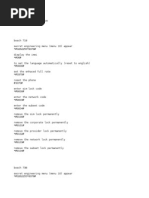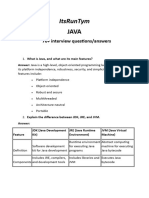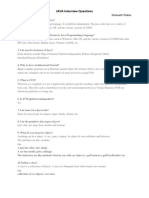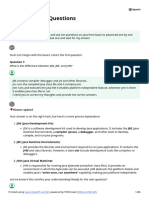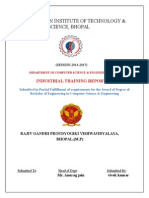Java Interview Questions
Uploaded by
ottacc2022Java Interview Questions
Uploaded by
ottacc2022Here are 25 Java interview questions along with their answers, covering basic to advanced
concepts:
1. What is Java?
Java is a high-level, object-oriented programming language developed by Sun Microsystems
(now owned by Oracle). It is platform-independent due to its "Write Once, Run Anywhere"
(WORA) feature enabled by the Java Virtual Machine (JVM).
2. What are the main features of Java?
Platform Independence (JVM)
Object-Oriented
Automatic Memory Management (Garbage Collection)
Multi-threaded
Secure and Robust
Rich API
3. What is the difference between JDK, JRE, and JVM?
Component Description
Includes JRE + development tools (compiler, debugger,
JDK (Java Development Kit)
etc.)
JRE (Java Runtime
Includes JVM + libraries to run Java applications
Environment)
JVM (Java Virtual Machine) Converts bytecode into machine-specific code
4. What is the difference between an interface and an abstract class?
Feature Abstract Class Interface
Can have both abstract & Only abstract methods (Java 7); Java 8+
Methods
concrete methods allows default & static methods
Variables Can have instance variables Only public, static, and final constants
Multiple
Not supported Supported
Inheritance
Constructor Yes No
5. What is the difference between == and .equals()?
== compares memory reference (checks if both objects refer to the same memory
location).
.equals() compares content (checks if two objects have the same value).
Example:
String s1 = new String("Java");
String s2 = new String("Java");
System.out.println(s1 == s2); // false (different objects)
System.out.println(s1.equals(s2)); // true (same content)
6. What are wrapper classes in Java?
Wrapper classes convert primitive types into objects.
Example:
int → Integer
double → Double
char → Character
Example:
Integer num = Integer.valueOf(10); // Autoboxing
int value = num.intValue(); // Unboxing
7. What is the difference between ArrayList and LinkedList?
Feature ArrayList LinkedList
Storage Dynamic array Doubly linked list
Access time Fast (O(1) for get()) Slow (O(n) for get())
Insertion/Deletion Slow (O(n) at middle) Fast (O(1) at head/tail)
8. What is the difference between HashMap and Hashtable?
Feature HashMap Hashtable
Thread-safe No Yes (synchronized)
Null keys/values 1 null key, multiple null values No null keys or values
Performance Faster Slower
9. What is the difference between String, StringBuffer, and StringBuilder?
Feature String StringBuffer StringBuilder
Mutability Immutable Mutable Mutable
Thread-safe Yes Yes (synchronized) No (not synchronized)
Performance Slow Slower Fastest
Example:
StringBuilder sb = new StringBuilder("Hello");
sb.append(" Java");
System.out.println(sb); // Hello Java
10. What is an exception in Java?
An exception is an unexpected event that disrupts program execution. Java has:
Checked Exceptions (e.g., IOException)
Unchecked Exceptions (e.g., NullPointerException)
Errors (e.g., OutOfMemoryError)
Example:
try {
int a = 5 / 0;
} catch (ArithmeticException e) {
System.out.println("Cannot divide by zero!");
}
11. What are Java access modifiers?
Modifier Scope
public Accessible everywhere
protected Accessible within the same package + subclasses
default Accessible within the same package only
private Accessible within the same class only
12. What is polymorphism?
Polymorphism allows a method to have different forms.
Compile-time polymorphism (Method Overloading)
Runtime polymorphism (Method Overriding)
Example:
class Animal {
void sound() { System.out.println("Animal makes a sound"); }
}
class Dog extends Animal {
void sound() { System.out.println("Dog barks"); }
}
13. What is multithreading in Java?
Multithreading allows concurrent execution of multiple threads.
Example:
class MyThread extends Thread {
public void run() { System.out.println("Thread running"); }
}
new MyThread().start();
14. What is the volatile keyword in Java?
volatile ensures that a variable's value is always read from main memory, preventing
caching issues in multi-threaded environments.
15. What is the final keyword in Java?
Final variable → Cannot be reassigned.
Final method → Cannot be overridden.
Final class → Cannot be inherited.
Example:
final class MyClass { }
// class SubClass extends MyClass { } // Error: cannot inherit from final
class
16. What is serialization in Java?
Serialization converts an object into a byte stream for storage/transmission.
Example:
class Employee implements Serializable { int id; String name; }
17. What is the transient keyword?
transient prevents serialization of a variable.
Example:
class Employee implements Serializable {
transient int salary; // Won't be serialized
}
18. What is a constructor in Java?
A constructor initializes an object when it is created.
Example:
class Person {
Person() { System.out.println("Constructor called"); }
}
19. What is the difference between throw and throws?
throw → Used to explicitly throw an exception.
throws → Declares exceptions in a method signature.
Example:
void myMethod() throws IOException { }
20. What is a functional interface in Java?
A functional interface has exactly one abstract method.
Example:
@FunctionalInterface
interface MyInterface {
void sayHello();
}
21. What are Java Streams?
Java Streams process data in a functional style.
Example:
List<String> names = List.of("John", "Jane", "Jack");
names.stream().filter(n -> n.startsWith("J")).forEach(System.out::println);
22. What is the difference between Callable and Runnable?
Runnable → Does not return a value.
Callable → Returns a value.
Example:
Callable<Integer> task = () -> 10;
23. What is reflection in Java?
Reflection allows inspection/modification of classes, methods, and fields at runtime.
24. What is the purpose of the default method in interfaces?
default methods in interfaces provide implementation while allowing backward
compatibility.
25. What is a deadlock?
Deadlock occurs when two or more threads are waiting on each other, preventing execution.
Want more in-depth explanations? Let me know! 🚀
You might also like
- The C# Player's Guide - 5th Edition - 5.0.083% (18)The C# Player's Guide - 5th Edition - 5.0.0497 pages
- Introduction To Computer Theory by Cohen Solutions Manual80% (5)Introduction To Computer Theory by Cohen Solutions Manual198 pages
- Ap Computer Science Principles Practice Exam and Notes 202186% (7)Ap Computer Science Principles Practice Exam and Notes 2021108 pages
- Hacking The Art of Exploitation 2nd Edition Jon Erickson100% (20)Hacking The Art of Exploitation 2nd Edition Jon Erickson492 pages
- PrepTest 83 - Print and Take Test - 7sage Lsat100% (3)PrepTest 83 - Print and Take Test - 7sage Lsat46 pages
- Teamcenter 13.1 Window Client Installation GuideNo ratings yetTeamcenter 13.1 Window Client Installation Guide102 pages
- Latest Java Interview Question and AnswersNo ratings yetLatest Java Interview Question and Answers8 pages
- JAVA INTERVIEW QUESTIONS AND THEIR ANSWERSNo ratings yetJAVA INTERVIEW QUESTIONS AND THEIR ANSWERS20 pages
- 20 commonly asked Java interview questions and their concise answersNo ratings yet20 commonly asked Java interview questions and their concise answers4 pages
- Core Java Interview Questions With AnswersNo ratings yetCore Java Interview Questions With Answers8 pages
- Top 50 Most Frequent Java Interview Questions & AnswerNo ratings yetTop 50 Most Frequent Java Interview Questions & Answer24 pages
- Java Interview Preparation questions and answersNo ratings yetJava Interview Preparation questions and answers23 pages
- 500 Java J2EE Interview Questions and Answers PDFNo ratings yet500 Java J2EE Interview Questions and Answers PDF70 pages
- 25 JAVA Specific Questions For Interviews-1No ratings yet25 JAVA Specific Questions For Interviews-17 pages
- Core Java Interview Questions and AnswersNo ratings yetCore Java Interview Questions and Answers8 pages
- Java For Testers - Interview Questions and Answers Part-6: "Automation"No ratings yetJava For Testers - Interview Questions and Answers Part-6: "Automation"4 pages
- Chinmoy Mukherjee-Cracking The Coding Interview - 60 Java Programming Questions and Answers (Volume 1) - CreateSpace Independent Publishing Platform (2015)No ratings yetChinmoy Mukherjee-Cracking The Coding Interview - 60 Java Programming Questions and Answers (Volume 1) - CreateSpace Independent Publishing Platform (2015)27 pages
- JAVA Interview Questions: Dinanath ThakurNo ratings yetJAVA Interview Questions: Dinanath Thakur5 pages
- Two? The Modifier Static Can Be Used With A Variable and Method. When Declared AsNo ratings yetTwo? The Modifier Static Can Be Used With A Variable and Method. When Declared As9 pages
- Q2. Explain Public Static Void Main (String Args ) in JavaNo ratings yetQ2. Explain Public Static Void Main (String Args ) in Java9 pages
- Java Core Interview in Australia. Questions and Answers. Tech interviewer’s notesFrom EverandJava Core Interview in Australia. Questions and Answers. Tech interviewer’s notesNo ratings yet
- Java Core Interview Questions and Answers. Tech interviewer’s notesFrom EverandJava Core Interview Questions and Answers. Tech interviewer’s notes1/5 (1)
- Coding With JavaScript For Dummies Everything To Know About JavaScript (2020) - 40153100% (1)Coding With JavaScript For Dummies Everything To Know About JavaScript (2020) - 40153247 pages
- NWO, Illuminati, Freemason, Occult, Bible Prophecy, Conspiracy, Secret Society, Etc. LinksNo ratings yetNWO, Illuminati, Freemason, Occult, Bible Prophecy, Conspiracy, Secret Society, Etc. Links47 pages
- Structured and Unstructured Maintenance With Example0% (1)Structured and Unstructured Maintenance With Example9 pages
- Python Programming For Beginners - A Crash Course To Learn Python and Other Recommended Coding83% (6)Python Programming For Beginners - A Crash Course To Learn Python and Other Recommended Coding86 pages
- LINUX COMMAND LINE An Introduction To Linux Command Line EnvironmentNo ratings yetLINUX COMMAND LINE An Introduction To Linux Command Line Environment174 pages
- Learn To Code HTML and CSS Develop Style Websites PDF100% (2)Learn To Code HTML and CSS Develop Style Websites PDF595 pages
- How To Use PATS Module Initialization FunctionNo ratings yetHow To Use PATS Module Initialization Function5 pages
- List of Oracle Modules Available at ISQL GLOBAL: Course TitleNo ratings yetList of Oracle Modules Available at ISQL GLOBAL: Course Title4 pages
- Automated Greeting System: Mohd Afzal Jeelani (1400118073) & Mohd Faisal (1400118083)No ratings yetAutomated Greeting System: Mohd Afzal Jeelani (1400118073) & Mohd Faisal (1400118083)51 pages
- Radharaman Institute of Technology & Science, Bhopal: Industrial Training ReportNo ratings yetRadharaman Institute of Technology & Science, Bhopal: Industrial Training Report44 pages
- Maintenance Strategy / Deadlines For SAP GUI For Windows / SAP GUI For JavaNo ratings yetMaintenance Strategy / Deadlines For SAP GUI For Windows / SAP GUI For Java10 pages
- Cycle 2 - Weeks 3-4 - Differences JDK, JRE.. - PDFNo ratings yetCycle 2 - Weeks 3-4 - Differences JDK, JRE.. - PDF4 pages
- (eBook PDF) Introduction to Java Programming and Data Structures, Comprehensive Version, 11th Global Edition instant download100% (5)(eBook PDF) Introduction to Java Programming and Data Structures, Comprehensive Version, 11th Global Edition instant download57 pages








